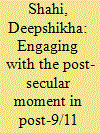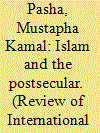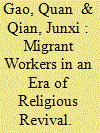|
|
|
Sort Order |
|
|
|
Items / Page
|
|
|
|
|
|
|
| Srl | Item |
| 1 |
ID:
147972


|
|
|
|
|
| Summary/Abstract |
9/11 and the subsequent war on terror in Afghanistan have severely challenged the idea of a world politics based on secular modernity. While the post-9/11 Afghan society remains troubled with the post-secular conflict between the so-called Islamic-terrorist and secular-democratic forces, the need for a ‘humanist’ political discourse that could pave the way for peace has become paramount. This paper explores the viability of ‘post-Islamism’ as an alternative humanist political discourse. It sets out to demonstrate how a post-Islamic humanist discourse, which is defined by the dialogic process of developing a hermeneutical understanding of Islamic philosophy, has the potential to not only carve the way for peace amidst perilous entanglement between politics and religion in post-secular Afghanistan, but also vindicate Islam of its unjustified denigration in the contemporary world.
|
|
|
|
|
|
|
|
|
|
|
|
|
|
|
|
| 2 |
ID:
117461


|
|
|
|
|
| Publication |
2012.
|
| Summary/Abstract |
The language of the 'postsecular' acknowledges the enduring presence of faith in politics, repudiating secularisation theses claiming diminution or privatisation of religion in social and political life. In cognitive and experiential worlds, those presumably unfettered by these conceptions (for example, the Islamic Cultural Zones or ICZs), the postsecular presents a different order of challenge and possibility. The term ICZs refers to Muslim majority areas informed by transnational subjectivities loosely connecting varied Islamic societies around symbolic commonality, memory, and historical experience. The term stresses the plurality of Islamic cultural experience, albeit distinguished by recognisable semiotic markers, without essentialising Islamic identity. This article questions the hegemonic view pervasive in both secular and postsecular theorising of the fiction of immutability of faith in the ICZs and recognises its rupture and displacement under conditions of late modernity. The ontological dislocation in the character of religion itself under conditions of late modernity opens up the possibility to account for the assumed resistance of Islam to secular modernity, but also to explain Islam's imbrications in politics read under the sign of Political Islam. Paradoxically, under the condition of late modernity, a more homogenised Islam appears to crystallise in the ICZs at odds with an 'open' Islam.
|
|
|
|
|
|
|
|
|
|
|
|
|
|
|
|
| 3 |
ID:
173458


|
|
|
|
|
| Summary/Abstract |
In the reform era, China appears to be caught in a contradictory dual process – the entrenchment of secular values and simultaneously, the notable revival of all forms of religion. However, the existing literature has achieved limited success theorizing how the thriving of faiths constitutes, and co-evolves with, secular modernity and capitalism. This article contributes to this re-theorization by bringing migration, labour and industrial capitalism to bear on faith and religious practices. Our empirical study in Shenzhen focuses on the formation of rural-to-urban migrant workers’ Christian faith. We examine the ways in which migrant workers manoeuvre religion as a cultural, symbolic and discursive resource to come to terms with, but also sometimes to question and counteract, the double exploitation enforced by state regulation and labour relations. In the meantime, however, this article also argues that migrants’ efforts in self-transformation through the discourses of benfen and suzhi, and their theologically mediated interpretation of alienation, labour exploitation and social inequality, overlap with, and reinforce, the agenda of producing docile, productive bodies of migrants, an agenda endorsed by the state–capital coalition. This research opens new opportunities for theorizing how capitalist secularity and religious orientation implicate one another in the current Chinese society.
|
|
|
|
|
|
|
|
|
|
|
|
|
|
|
|
| 4 |
ID:
128663


|
|
|
|
|
| Publication |
2014.
|
| Summary/Abstract |
This article examines how possibilities for Muslim expression were and are shaped by the political imaginaries in Soviet-era and independent Uzbekistan. It develops the concept of social 'imaginary' in Charles Taylor's critique of Western secular modernity. Political imaginaries are the assumptions about the nature of being, the essential categories through which the world is understood and acted upon, that are produced within dominant state discourses and that shape the space for the political. The article compares the Soviet vision of socialist modernity and the logic of the current state ideology in independent Uzbekistan, and discusses how these have framed the possibilities for being Muslim. It argues that the category of culture is produced in distinct and contrasting ways in these imaginaries, and plays a central role in delineating the public space for Islam.
|
|
|
|
|
|
|
|
|
|
|
|
|
|
|
|
|
|
|
|
|